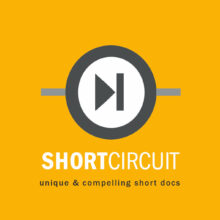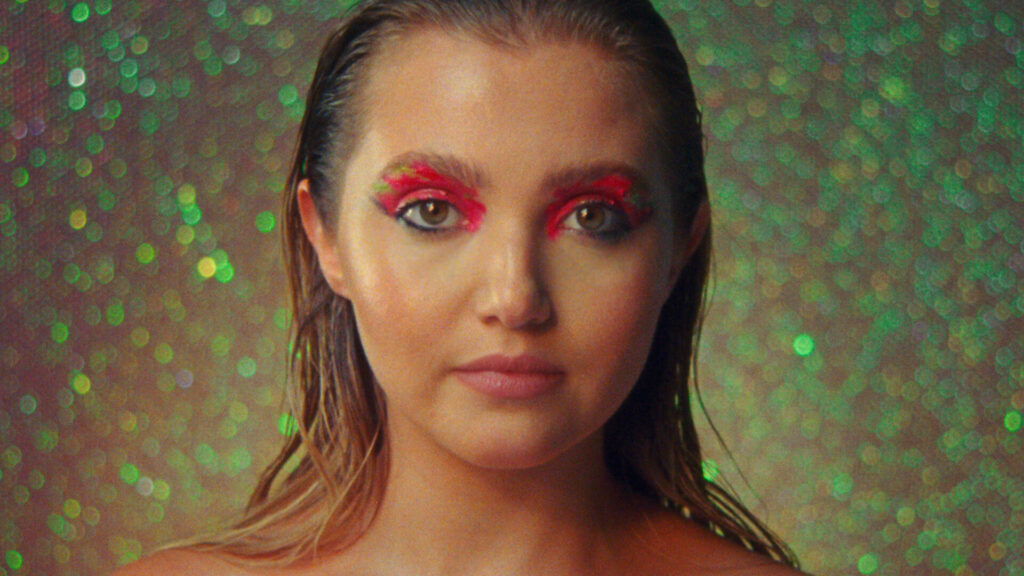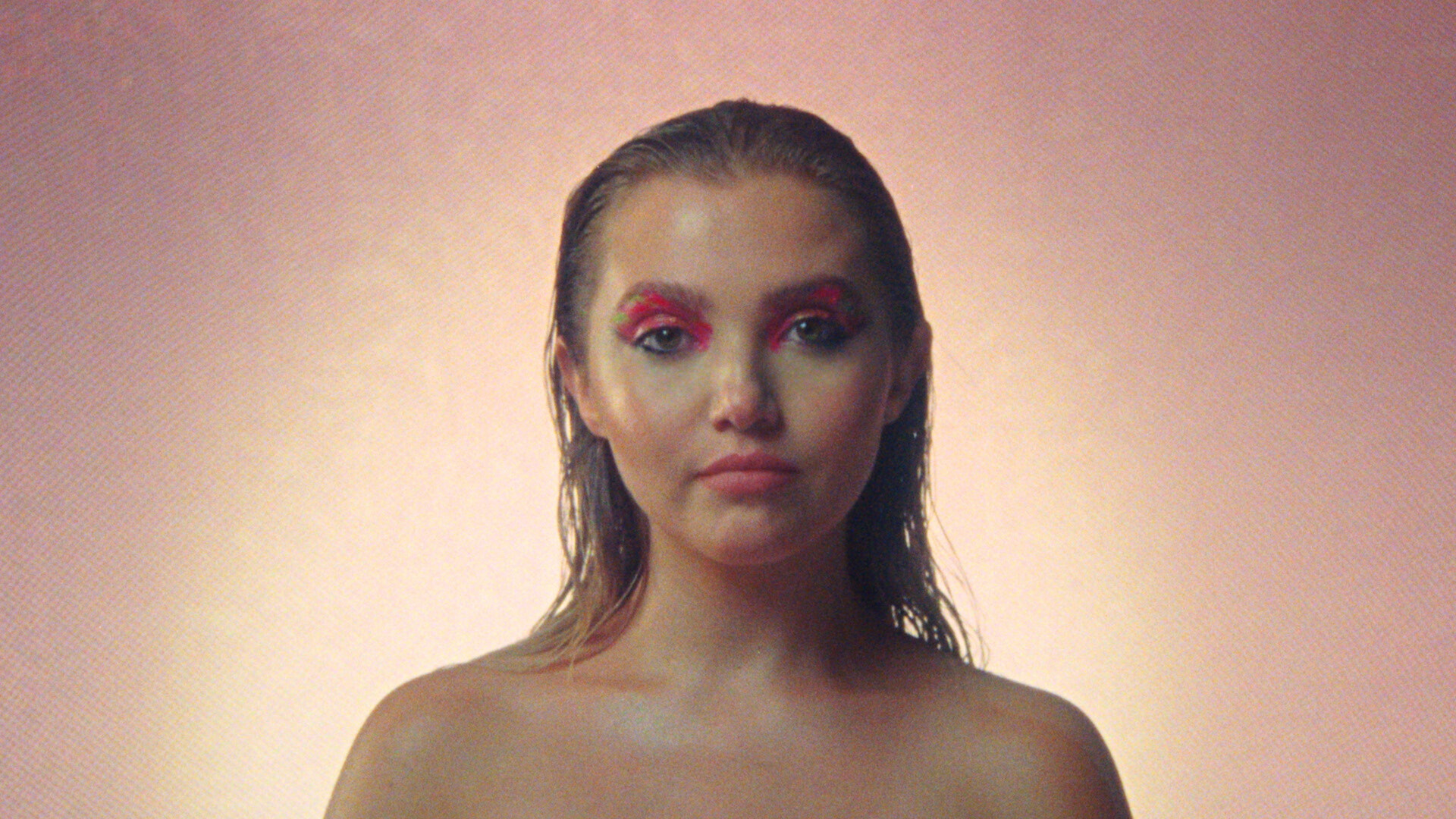Bec is a director and writer exploring high concept and expansive perspectives through
contained yet intricately detailed words, visual imagery and formats.’Does that make me a woman?’ her hybrid documentary exploring the contradictions of modern womanhood won Best Screenplay at BAFTA & BIFA qualifying Aesthetica Film Festival and screened in the Hear, Here programme at Fabrica in April.
Hybrid documentary has been described as nonfiction filmmaking that uses cinematic
devices to explore truths. Why do you describe your film as a hybrid documentary?
BE: I have always struggled to specify genre and form when it comes to my own work. I find being
required to define ‘art’, in any form, with singular words, or adhere to rules of a form, hugely
limiting. At the same time I understand that these words and rules are used to help people
understand, and definition or restriction can also give a sort of freedom to play. So, in truth, I
landed on ‘hybrid documentary’ as a way to get people – audiences, curators, viewers to watch
my work and not render it a talent led piece of ‘content’ or a ‘poetry film’. But, also, in all of my
work I am interested in the merging of genres, forms, perspectives – the grey area – the mix. I
am not interested in rudimentary definitions like ‘good’ or ‘bad’ or simply ‘documentary’ or
‘comedy’. There is nothing in this world which is ever a singular thing. To this end, the poem that
I wrote is also a screenplay and the screenplay that I wrote is a poem. It was and still is true to
who I am when it came out of me and when I shared it with people I realised it was relatable to
many. I’ve just always believed that cinema is the medium through which stories, of any kind,
can most powerfully be accessed. So to bring this project to life, on screen, with an actress like
Mia McKenna-Bruce felt like serendipitous creative magic.
Could you talk about the decision to tell this story through poetry?
BE: Poetry has always been something I’ve written but it’s never been a very conscious decision. It
is something that comes more instinctively. Creating Does That Make Me A Woman? was more
instinct than it was a decision made. I’m not in the poetry world. I’ve not felt brave enough to call
myself a poet. I have never learnt the rules of the form. I’m not sure why, but I never felt able to
access the poetry. Some of the writers I admire most though are those who subvert the rules of
poetry or spin them on their head to do incredible things – people like Caleb Femi or Vanessa
Kissule. Sometimes I think poetry is the only way to communicate the specificity and raw-ness
of inner worlds but you don’t get to choose whether that specificity or raw-ness will land with
other people or not.
Your choice of distinctive colours, iridescent textures, graphics and makeup on the film
is bold and quietly unsettling at the same time. What led you to these choices?
BE: I workshopped several different ideas when developing the project and made the conscious
decision to lean into stereotypical representations of femininity. Knowing that I didn’t want to shy
away from what is generally considered ‘feminine’ I was then able to collaborate with Luciana
Riso, the cinematographer on the project, and Mata Marielle, the make-up artist, with a clear
vision while enabling them to bring the brilliance of their creative expertise. So leaning into ‘pink,
sparkly, intensity’ naturally meant that in trialling different materials for backdrops and colours for
eye shadows the complexities of pink, red and everything in between brought distinctive colours
and textures to the forefront. Femininity seemed to take on its natural multidimensionality
through both the endless shifting light and colour of the backdrop, and the layering of the eye
shadow. This all happened through on the day creative collaboration.
How important was it for you to tell this story both in partnership with the charity Women
& Health and with a crew made up of predominantly women? How did working with them
affect your approach to the project?
BE: I am an ex-service user of Women & Health and collaborating with them meant everything to
me. For them to embrace a project as explicit and raw felt really brave as many charities
wouldn’t get close. It felt important to me to capitalise off the leverage the project had, with Mia
McKenna-Bruce’s incredible performance and powerful platform, to support a charity so close to
my heart. Working with a crew of predominantly women is something I always try to do whether
the project is directly about women or not. Being able to collaborate with women informs
everything I do and how I do it. It is the richest sort of sharing.
Following her lead role in Molly Manning Walker’s ‘How to Have Sex’, and her ability to
depict nuanced emotions with such subtlety, Mia McKenna-Bruce is a perfect lead. You
say that characters and collaborators are often people you know- is this how you came to
work with Mia?
BE: Mia was not someone I knew on a personal level before we collaborated on Does That Make
Me A Woman? However, the casting executives I worked with are people I have known for
long time. Jo Harris is one of my closest friends since we were teens at our local state school
and has been a support I have needed when I have lacked my own self belief. Stephanie Okoye
is a casting executive I first collaborated with on a project back in 2020/2021 called Blue
Corridor 15, by the incredible Dubheasa Lanipekun, and I knew when I introduced her to Jo they
would get on. She’s now part of multiple creative ventures but previously she was working with
Jo at Des Hamilton Casting. The support of Des Hamilton as a person and through his casting
agency and the people he employs has been absolutely fundamental to this project and has
meant that I now have a relationship with Mia which I really hope will last.
You describe your work as being grounded in realism but often having a touch of dark
humour. What are you working on next and does it touch on the same realism?
BE: I am currently working on my next short film which is rooted in raw realism and dark avoidance
but I HOPE will be funny. I want to make films to entertain as much as I want them to hit you in
your gut. I have learnt first hand that some of the most painful and traumatic parts of life are also
the most ridiculous and to laugh is to survive.
Nowness describes this film as ‘exploring the stark polarities of womanhood’ which struck a
chord with our Short Circuit audience. You can watch Bec’s film HERE on Nowness


